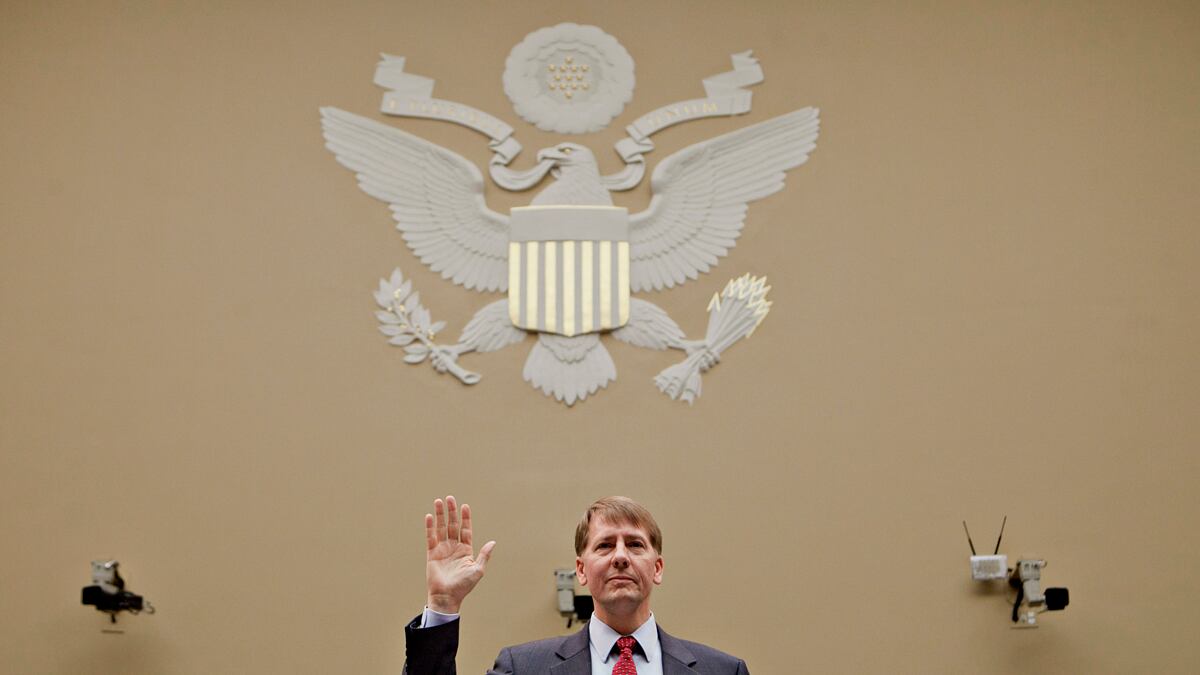Mitt Romney called it “the most powerful and unaccountable bureaucracy in the history of our nation.” Senate Republican leader Mitch McConnell said more or less the same after President Obama, at the start of the year, appointed Richard Cordray as the head of the new Consumer Financial Protection Bureau. This new agency created by Dodd-Frank, McConnell offered, “is poised to be one of the least accountable and most powerful agencies in Washington.” Richard Shelby, the ranking Republican on the Senate Banking committee complained, “There’s no oversight, there’s no accountability.”
And yet for an agency that supposedly is answerable to no one, its people sure do testify a lot before Congress. The CFPB’s doors have been open for all of six months but already its people have been hauled before the House Oversight and Government Reform committee no less than three times. And when on Wednesday morning agency head Richard Cordray takes his seat before the House Committee on Financial Services, it will mark the 14th time an agency representative—Cordray, agency architect Elizabeth Warren (who recruited Cordray to the CFPB), or one of their minions –has appeared before Congress since March.
Cordray will have nothing fresh to say, of course. The agency is too new to have a track record of enforcement or rule-making so once again he’ll lay out its goals: transparency in all financial transactions, better financial education, a crackdown on “unfair, deceptive, or abusive” practices whether in the writing of a $400,000 mortgage or a $300 payday loan. He’ll reassure Congress that he welcomes their input and once again he’ll use a 1970 quote from Ronald Reagan to help sum up his philosophy.

He quoted Reagan when he appeared in January before a subcommittee of the House Oversight and Government Reform: “Free men engaged in free enterprise build better nations with more and better goods and services, higher wages and higher standards of living for more people. But free enterprise is not a hunting license.” He used that same “hunting license” quote when he appeared before the Senate Banking Committee later that month. And he’ll repeat that same Reagan quote once more on Wednesday according to the prepared testimony the CFPB press office sent out in advance of his appearance on Capitol Hill.
Cordray, the former Attorney General of Ohio, will again go to great lengths to show that he’s fair-minded and not someone convinced that all banks are evil. Sure, some people lost their homes due to “unscrupulous businesses” that “obscured loan terms or engaged in outright fraud.” But that’s only part of the story. “Sometimes people made bad decisions,” he’ll say in his opening statement. “Sometimes an unexpected event—like a loved one getting sick or a family member losing a job—overwhelmed even the most careful planning.”
Yet nothing Cordray says will make much difference. Polls show that Dodd-Frank is the president’s most popular legislative accomplishment. According to one poll, 74 percent of the electorate supports an agency that protects consumers against abuses by financial institutions. So Republicans part of the House Financial Services committee (just like their counterparts on both House Oversight and Senate Banking) will cast Cordray as an anti-business crusader trying to deny hard-working Americans access to credit—a “credit czar,” to quote Rep. Spencer Bachus, the Republican chairman of the Financial Services Committee, who said at the end of 2010 that Congress was “there to serve the banks.”
The CFPB is “a pretty scary thing,” Rick Santorum said recently on the campaign trail. It can determine “what loans you’re going to be able to qualify for, who you can do business with.” None of that’s true—the CFPB will have no say over who qualifies for what loan or who a consumer can do business with, unless that business is employing “unfair, deceptive, or abusive” practices—but that didn’t stop this presidential hopeful from concluding that the CFPB’s supposed policies prove that the Obama administration sees people in business as “nefarious” by nature.






